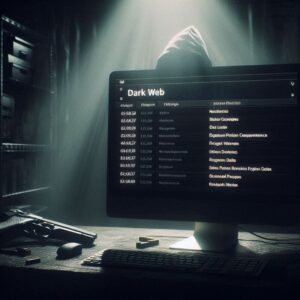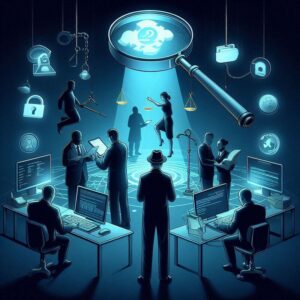Delving Deep into Dark Web Investigations: Uncovering Its Complexities
The Dark Web represents a fascinating yet obscure segment of the internet, cloaked in mystery and largely beyond the reach of conventional search engines. Accessing this hidden network requires users to utilize specialized software, unique configurations, or obtain specific permissions, which only adds to its intrigue. Known for its high degree of user anonymity and untraceability, this shadowy domain is a hotspot for various illicit activities. Frequently tied to unlawful operations such as drug trafficking, arms sales, and human trafficking, it also serves as a hub for cybercriminals who engage in the trade of stolen personal data, credit card information, and other sensitive materials. Within this secretive environment, users can engage in illegal transactions, participate in forbidden forums, and connect with communities that operate outside the boundaries of the law, all while feeling shielded from potential detection by law enforcement.
In sharp contrast to the conventional surface web, the Dark Web is constructed on a sophisticated infrastructure that expertly conceals users’ identities through advanced encryption techniques and multiple layers of anonymity. Most users access this hidden digital realm using specialized software like Tor (The Onion Router), which anonymizes online activities by routing internet traffic through a network of volunteer-operated servers. This intricate routing method significantly complicates efforts by anyone attempting to conduct network surveillance or traffic analysis, making it exceptionally difficult to trace a user’s location or actions. Although the Dark Web can serve as a secure communication platform for whistleblowers and political dissidents, its infamous reputation primarily stems from its associations with criminal enterprises and illegal activities, presenting serious challenges for law enforcement agencies.
Proven Strategies for Safely Navigating the Dark Web
- Acknowledge that the Dark Web is a concealed part of the internet that requires specific software for access and is often linked to illegal activities.
- Understand that exploring the Dark Web entails significant risks, including identity theft, financial fraud, and exposure to explicit content.
- DarkSearch stands out as a crucial tool that equips users to securely explore the Dark Web through its anonymous search engine capabilities.
- During your exploration, expect to encounter a blend of illicit products and services, stolen data, black market activities, and even legitimate content within the Dark Web.
- To enhance safety while navigating the Dark Web, employing a secure VPN, exercising caution with links, and judiciously managing personal data sharing are essential.
Recognizing and Mitigating Risks Associated with the Dark Web
The Dark Web presents significant risks not only to individuals but also to society as a whole. It has become a notorious hub for criminal activities, including the rampant sale of narcotics, firearms, and stolen personal information, which fuels various criminal organizations. This perilous environment heightens the likelihood of identity theft, financial fraud, and other cybercrimes that can have severe repercussions for unsuspecting users. The anonymity offered by the Dark Web complicates law enforcement’s efforts to track and apprehend offenders, providing cybercriminals with a false sense of security.
Furthermore, the Dark Web plays a disturbing role in facilitating human trafficking and exploitation. Its unregulated and anonymous nature creates a sanctuary for traffickers, contributing to an alarming increase in the online exploitation of vulnerable populations, particularly young individuals who may be coerced into sex work or other forms of modern slavery. Additionally, the Dark Web often serves as a breeding ground for extremist ideologies and terrorist propaganda, posing serious threats to national security and public safety. This reality emphasizes the critical need for continuous vigilance and proactive measures from society to combat these dangers.
The pervasive presence of illicit content and activities on the Dark Web carries extensive societal implications. It fosters a culture of lawlessness that undermines efforts to create a safe online environment. Therefore, it is imperative for users to remain aware of the inherent dangers associated with the Dark Web and take proactive steps to protect themselves from its potentially harmful impacts.

Expert Insights for Securely Exploring the Dark Web Using DarkSearch
DarkSearch is an innovative search engine meticulously crafted to empower users to navigate the Dark Web securely and privately. This advanced tool allows individuals to search for specific content without compromising their anonymity or personal privacy. DarkSearch employs robust encryption and privacy safeguards, ensuring that users can traverse the Dark Web without the looming threat of being tracked or monitored by malicious entities.
A standout feature of DarkSearch is its ability to offer users a carefully curated selection of verified and trustworthy Dark Web websites. This functionality is crucial in helping users avoid illegal or harmful content, directing them instead toward reputable resources and information. Furthermore, DarkSearch integrates built-in security measures designed to protect users from fraudulent sites and phishing scams, significantly reducing the risk of falling victim to cybercrime during their browsing experience.
In addition to enhancing security, DarkSearch unlocks a wealth of information and resources that are typically unreachable on the surface web. This includes niche forums, marketplaces, and communities dedicated to a wide array of interests, enabling users to connect with like-minded individuals in a secure and private environment. By leveraging the capabilities of DarkSearch, users can responsibly explore the Dark Web, skillfully navigating around the pitfalls associated with illegal activities while still accessing valuable information and insights.

Diverse Content Available on the Dark Web: What You Need to Know
The Dark Web boasts an extensive variety of content, encompassing both legitimate and illegal activities. Its notorious reputation mainly arises from its role as a marketplace for illicit goods and services, including the exchange of drugs, firearms, counterfeit currencies, and stolen personal data. This secretive environment is particularly appealing to criminals looking to conduct transactions while minimizing the risk of detection by law enforcement.
Beyond these illegal marketplaces, the Dark Web also houses forums and groups that engage in discussions on a myriad of topics, including hacking, cybercrime, political activism, and whistleblowing. These platforms provide individuals with secure spaces to engage in controversial discussions and share information without the fear of censorship or surveillance. However, they can also become breeding grounds for criminal behavior and extremist views, posing significant threats to public safety and national security.
Despite its associations with illegal activities, the Dark Web plays essential roles. It provides a secure platform for whistleblowers and activists to disseminate critical information and highlight issues of corruption and human rights violations without the threat of retribution. Additionally, the Dark Web is home to a wealth of resources and information that may be censored or unavailable on the surface web, making it an invaluable tool for those seeking uncensored knowledge and alternative viewpoints.
Essential Safety Guidelines for Navigating the Dark Web
Exploring the Dark Web exposes users to various risks, but numerous strategies exist to safeguard against potential dangers. Utilizing specialized software like Tor enables secure browsing of the Dark Web, as it encrypts internet traffic, effectively concealing users’ locations and online activities from potential surveillance or traffic analysis, which empowers users with enhanced privacy.
Practicing caution is critical during Dark Web exploration. It is essential to avoid clicking on unknown links or downloading unexpected files, as the Dark Web is rife with malicious sites designed to steal sensitive information or infect users’ devices with malware. Users can bolster their security by limiting their visits to trusted and verified websites while navigating this hidden digital landscape.
Moreover, individuals should refrain from sharing personal information or engaging in transactions on the Dark Web. The inherent anonymity of this environment complicates the verification of merchants or buyers, significantly increasing the risk of scams and fraud.
Employing a virtual private network (VPN) can greatly enhance security while exploring the Dark Web. A VPN encrypts internet traffic and masks the user’s IP address, making it more challenging for malicious actors to trace or monitor online activities.
By adhering to these safety guidelines and exercising vigilance during Dark Web explorations, users can significantly reduce their exposure to potential threats and protect themselves from the dangers associated with cybercrime.
Understanding Legal and Ethical Implications of Using DarkSearch
When using DarkSearch or engaging with the Dark Web, individuals must be acutely aware of the legal and ethical implications involved. Accessing certain types of content or participating in specific activities on the Dark Web could violate local laws or ethical standards, potentially leading to serious legal consequences or moral dilemmas.
A crucial legal consideration when using DarkSearch is the risk of encountering unlawful content or activities. Users must recognize that accessing illegal marketplaces or engaging in criminal activities on the Dark Web can result in severe legal repercussions, including prosecution and imprisonment. Therefore, exercising caution and adhering to local laws while exploring the Dark Web is vital to avoid unintentional violations.
Equally significant is the understanding of the ethical ramifications associated with using DarkSearch. Users should be mindful of the dangers of engaging with harmful content or facilitating illegal actions on the Dark Web. This includes avoiding transactions involving illicit goods or services, steering clear of participating in criminal enterprises, and promptly reporting any illegal activities encountered during their exploration.
When accessing sensitive data or discussing controversial topics on the Dark Web, it is crucial to acknowledge the moral implications. Treating such subjects with care and empathy is essential, as it recognizes the potential impact on individuals or communities affected by these issues.
By remaining vigilant and considering the legal and ethical factors while using DarkSearch, individuals can navigate the Dark Web responsibly and safely.

Anticipating Future Developments in the Dark Web: Innovations and Their Consequences
The future landscape of the Dark Web is on the brink of significant advancements and developments that could dramatically shape its trajectory. As technology continues to evolve, concerns regarding the potential for increasingly sophisticated cybercriminal activities flourishing within the Dark Web are rising. Innovations in encryption techniques, anonymization technologies, and decentralized networks may further complicate law enforcement’s ability to monitor and control illegal activities in this concealed realm.
Moreover, the importance of international collaboration in addressing the challenges posed by the Dark Web cannot be overstated. Given that illicit operations on the Dark Web often transcend national borders, the need for cooperative actions among governments, law enforcement agencies, and technology companies is critically important. This includes sharing intelligence, coordinating efforts, and establishing regulatory frameworks to mitigate the risks associated with the Dark Web, highlighting the essential roles played by each entity in tackling this global issue.
Additionally, ongoing discussions surrounding potential government interventions aimed at combating unlawful activities on the Dark Web while safeguarding individual privacy rights are gaining traction. Striking a balance between addressing cybercrime and protecting freedom of expression and internet privacy presents a complex challenge. As policymakers navigate these intricate considerations, they must prioritize informed decision-making to ensure that legislative measures effectively combat illegal activities on the Dark Web without infringing upon individual rights.
Future developments in the Dark Web will have profound implications for cybersecurity, law enforcement, personal privacy rights, and global security. By staying informed about potential trends and changes, individuals can better understand the evolving landscape of the Dark Web and take proactive steps to protect themselves from its associated threats.
Thorough Answers to Frequently Asked Questions About the Dark Web
What is a Dark Web search engine, and how does it operate?
A Dark Web search engine is specifically engineered to assist users in navigating the Dark Web, a hidden segment of the internet that is not indexed by traditional search engines. This tool empowers individuals to discover and access concealed websites and exclusive content that is typically unreachable through standard web browsers, thereby enriching their exploration experience.
How do dark web search engines function?
Dark web search engines utilize specialized algorithms to crawl and index content located within the hidden corners of the Dark Web. These engines access concealed websites and extract information, making it searchable for users who wish to explore this hidden digital landscape more effectively and efficiently.
Is using a dark web search engine legal?
Utilizing a dark web search engine is not inherently illegal, as it serves merely as a tool for accessing content on the Dark Web. However, users must recognize that the Dark Web is often associated with illegal activities, and engaging with certain content or participating in unlawful actions may violate the law.
What risks are associated with using a dark web search engine?
Several risks accompany the use of dark web search engines, including exposure to illegal and harmful content, potential malware attacks, and the threat of being targeted by cybercriminals. Exercising caution and implementing appropriate security measures is essential when accessing the Dark Web to mitigate these risks.
Can I access the Dark Web without utilizing a dark web search engine?
Technically, it is possible to access the Dark Web without a search engine by using specialized software like Tor, which allows users to browse anonymously and reach hidden websites. However, utilizing a dark web search engine can simplify the process of finding specific content and enhance navigation through the Dark Web.
References:
Pros and Cons of Internet Usage – Good and Bad Effects. https://thetechprint.com/pros-and-cons-of-internet-usage
Is it Illegal to Access the Dark Web? – Exploring the Dark Corners of the Digital World: A Tale of Mexican Hackers. https://www.hackersmexicanos.com/is-it-illegal-to-access-the-dark-web/
The post Deep Search: Unveiling the Invisible Dark Web appeared first on Ezi Gold.
The Article: Dark Web Exploration: Discovering the Hidden Internet Depths Was Found On https://ai.ezi.gold
The Article Dark Web Exploration: Unveiling the Hidden Internet Secrets Was Found On https://limitsofstrategy.com



Comments are closed